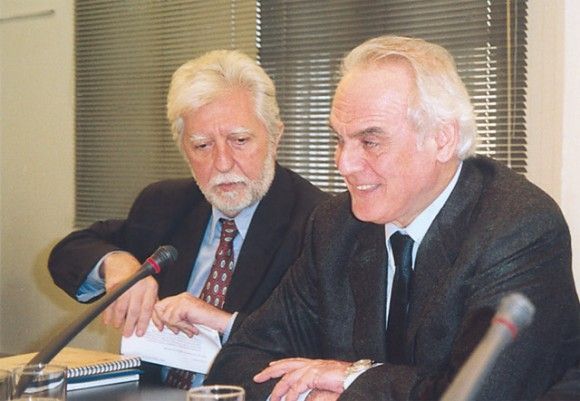A Common EU Tourism Policy Possible and Likely

Deputy Development Minister Dimitris Georgakopoulos and Greek Development Minister Akis Tsohatzopoulos.
The informal meeting last month of EU development ministers and tourism officials on the island of Crete laid the foundations for drafting a common tourism policy in the European Union by proposing specific measures on tourism promotion and communication.
The adoption of common EU policies that would strengthen the competitiveness of European tourism, said the delegates, makes up the big challenge that the European tourism industry faces in its effort to maintain a leading position in the world tourism market.
Representatives from the expanded EU’s 25 member states also expressed a common will to include a reference to tourism’s “significant contribution to sustainable economic, social and environmental development” in the new European Constitution, which is to be presented in 2004.
Greek Development Minister Akis Tsohatzopoulos, who chaired the two-day talks on behalf of the Greek EU presidency, made these announcements after completion of the meeting alongside EU Commission Erkii Liikannen. Mr. Tsohatzopoulos stressed that tourism issues would also be discussed, for the first time, in the EU’s Competitiveness Council, the new EU ministerial body aimed to ensure coordination of micro-economic policies.
He also announced a decision by the 25 EU members to create a common portal for the promotion of tourism on an EU level as part of a common EU tourism communication network.
Both the Greek minister and EU Commissioner Erkii Liikannen expressed their optimism over European tourism in 2003, despite the impact from the last month’s war in Iraq and the breakout of the SARS epidemic, both of which they said “are not expected to be either significant or long-lasting.”
The tourism sector is largely significant for the economies of EU member-states, with around two million companies that employ around eight million people in the industry. The World Tourism Organization expects tourism arrivals in Europe to reach two billion by 2020, with the tourism sector responsible for an average 12 percent to the gross domestic product of EU member-states.
Mr. Tsohatzopoulos told reporters that “it is important for the new Charter of the EU to recognize the role of the tourism sector in the European economy as a whole and to clearly specify its linkages with other common development policies, especially in the transport sector as transport costs exert a major influence on the tourism package.”
Francesco Frangialli, secretary-general of the World Tourism Organization, told the conference that international tourism has proven it can overcome crises: in 2001, after the September 11 terrorist attacks in the U.S., tourism arrivals globally fell only 0.5 percent, while domestic tourism rose. In 2002, despite an international economic slowdown, tourism arrivals rose 3.1 percent. Mr. Frangialli said that the tourism sector would overcome the war in Iraq and the SARS scare.
Deputy Development Minister Dimitris Georgakopoulos said that the two basic conclusions of the conference – that boosting the industry’s competitiveness through common policies in Europe was urgent and that the repercussions of the Iraq war and the SARS epidemic would be short-lived.
On the sidelines of the event, it was heard that Greece may after all host next October’s World Tourism Organization’s (WTO) conference as the SARS epidemic scare is leading officials to reconsider Beijing as the designated city. Sources speculated that WTO President Francesco Frangialli was favorably disposed toward the idea. Beijing beat Greece’s nomination of Rodos in WTO voting in Osaka in September 2001.




